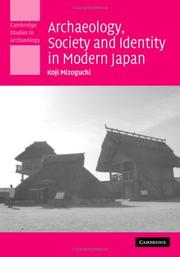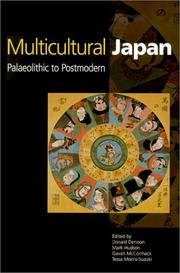| Listing 1 - 4 of 4 |
Sort by
|

ISBN: 9780521849531 9780511489556 9780521187794 0511191855 9780511191855 9780511190674 0511190670 0511190999 9780511190995 0511489552 0511191456 9780511191459 0521849535 0521187796 9780511316050 0511316054 1107164869 1280516178 Year: 2006 Publisher: Cambridge Cambridge University Press
Abstract | Keywords | Export | Availability | Bookmark
 Loading...
Loading...Choose an application
- Reference Manager
- EndNote
- RefWorks (Direct export to RefWorks)
This bold and illuminating study examines the role of archaeology in the formation of the modern Japanese nation and explores the processes by which archaeological practice is shaped by national social and intellectual discourse. Leading Japanese archaeologist Koji Mizoguchi argues that an understanding of the past has been a central component in the creation of national identities and modern nation states and that, since its emergence as a distinct academic discipline in the modern era, archaeology has played an important role in shaping that understanding. By examining in parallel the uniquely intense process of modernisation experienced by Japan and the history of Japanese archaeology, Mizoguchi explores the close interrelationship between archaeology, society and modernity, helping to explain why we do archaeology in the way that we do. This book is essential reading for anybody with an interest in the history of archaeology or modern Japan.
J2160 --- Japan: Archaeology and antiquities in general --- Archaeology --- J4127 --- Archeology --- Anthropology --- Auxiliary sciences of history --- History --- Antiquities --- Political aspects --- Social aspects --- Study and teaching --- Japan: Sociology and anthropology -- social identity and self --- Social Sciences

ISBN: 382587236X Year: 2004 Publisher: Münster Lit-Verlag
Abstract | Keywords | Export | Availability | Bookmark
 Loading...
Loading...Choose an application
- Reference Manager
- EndNote
- RefWorks (Direct export to RefWorks)
J2160 --- J2174.40 --- J4150.10 --- K9112.10 --- K9118 --- K9300.10 --- Japan: Archaeology and antiquities in general --- Japan: Archaeology and antiquities -- Kansai and Kinki region --- Japan: Sociology and anthropology -- cultural history -- Kodai, prehistoric and ancient, premodern --- Korea: Archaeology and antiquities by period -- prehistoric, earliest and ancient --- Korea: Archaeology and antiquities by region -- united and South Korea --- Korea: Social sciences -- social and cultural history -- ancient, earliest and premodern
Periodical
ISSN: 00815691 Year: 1929 Publisher: Stockholm Museum of Far Eastern Antiquities
Abstract | Keywords | Export | Availability | Bookmark
 Loading...
Loading...Choose an application
- Reference Manager
- EndNote
- RefWorks (Direct export to RefWorks)
China
---
East Asia
---
Antiquities
---
S15/0210
---
S17/0200
---
J2160.20
---
J2191.10
---
J6002
---
J6491.10
---
K9110.20
---
K9800
---
#BIBC:tijdschradm

ISBN: 0521003628 052155067X 1139084909 Year: 2001 Publisher: Cambridge Cambridge University press
Abstract | Keywords | Export | Availability | Bookmark
 Loading...
Loading...Choose an application
- Reference Manager
- EndNote
- RefWorks (Direct export to RefWorks)
This book challenges the conventional view of Japanese society as monocultural and homogenous. Unique for its historical breadth and interdisciplinary orientation, Multicultural Japan ranges from prehistory to the present, arguing that cultural diversity has always existed in Japan. A timely and provocative discussion of identity politics regarding the question of 'Japaneseness', the book traces the origins of the Japanese, examining Japan's indigenous people and the politics of archaeology, using the latter to link Japan's ancient history with contemporary debates on identity. Also examined are Japan's historical connections with Europe and East and Southeast Asia, ideology, family, culture and past and present.
J4000 --- J2229 --- J4129 --- J4206 --- J4150 --- J2160.90 --- Japan: Social sciences in general, social history --- Japan: Ethnology -- other peoples and tribes in Japan --- Japan: Sociology and anthropology -- cross-cultural contacts, contrasts and globalization --- Japan: Sociology and anthropology -- communities -- racial and ethnic --- Japan: Sociology and anthropology -- customs, folklore and culture --- Japan: Archaeology and antiquities -- theory, methodology and philosophy --- Japan --- Civilization --- -Foreign influences --- -Congresses. --- Foreign influences --- J2228 --- Nihon --- Nippon --- Iapōnia --- Zhāpān --- I︠A︡ponii︠a︡ --- Yapan --- Japon --- Japão --- Japam --- Mư̄ang Yīpun --- Prathēt Yīpun --- Yīpun --- Jih-pen --- Riben --- Government of Japan --- 日本 --- 日本国 --- Nipponkoku --- Nippon-koku --- Nihonkoku --- Nihon-koku --- State of Japan --- Япония --- Japani --- اليابان --- al-Yābān --- يابان --- Yābān --- Japonsko --- Giappone --- Japonia --- Japonya --- Jepun --- Yapon --- Yapon Ulus --- I︠A︡pon --- Япон --- I︠A︡pon Uls --- Япон Улс --- Social Sciences --- Anthropology
| Listing 1 - 4 of 4 |
Sort by
|

 Search
Search Feedback
Feedback About UniCat
About UniCat  Help
Help News
News